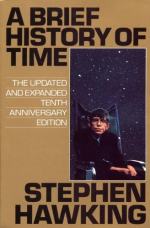
|
| Name: _________________________ | Period: ___________________ |
This test consists of 5 multiple choice questions, 5 short answer questions, and 10 short essay questions.
Multiple Choice Questions
1. What type of matter might account for gravitational forces that cannot be explained by the mass of our universe?
(a) Black hole matter.
(b) Dark matter.
(c) Nothing.
(d) Clear matter.
2. When Hitler came to power, where was Einstein?
(a) Europe.
(b) Russia.
(c) Germany.
(d) America.
3. Galileo argued, to the church, that when the Bible conflicted with common sense what happened?
(a) The Bible was allegorical.
(b) Common sense was the truth.
(c) That science should seek to know the truth.
(d) The Bible was the truth.
4. A long time friend of Galileo's held which high office in the church?
(a) Cardinal.
(b) Bishop.
(c) Pope.
(d) Priest.
5. Hawking's model of the universe says the universe will end how?
(a) It will end because black holes will suck all matter in.
(b) It will end because all matter will disappear.
(c) It will never end.
(d) It will end in a big explosion.
Short Answer Questions
1. According to Hawking, when the universe has lost all order, life will be what?
2. Mathematics is the language of what?
3. Black holes can capture matter particles and what other type of particles?
4. Superstring theory lacks what kind of evidence?
5. Hawking believes that scientists are too taken up with the "what" of the universe to ask which question?
Short Essay Questions
1. When and why did Einstein become a pacifist?
2. What is ironic about Einstein's involvement in U.S. politics?
3. Real time is described in math using what?
4. What is the difference between string theory and the other theories?
5. When did the early ideas that the universe is deterministic fall apart?
6. According to Hawking, people are naturally curious about what?
7. What might have happened to the black holes left over from the early period of the Big Bang?
8. What does a weak form of the anthropic principle hold for the view of the universe?
9. When you combine the general theory of relativity and quantum mechanics, what does that mean for the universe?
10. Hawking considers Galileo to be what?
|
This section contains 507 words (approx. 2 pages at 300 words per page) |

|




